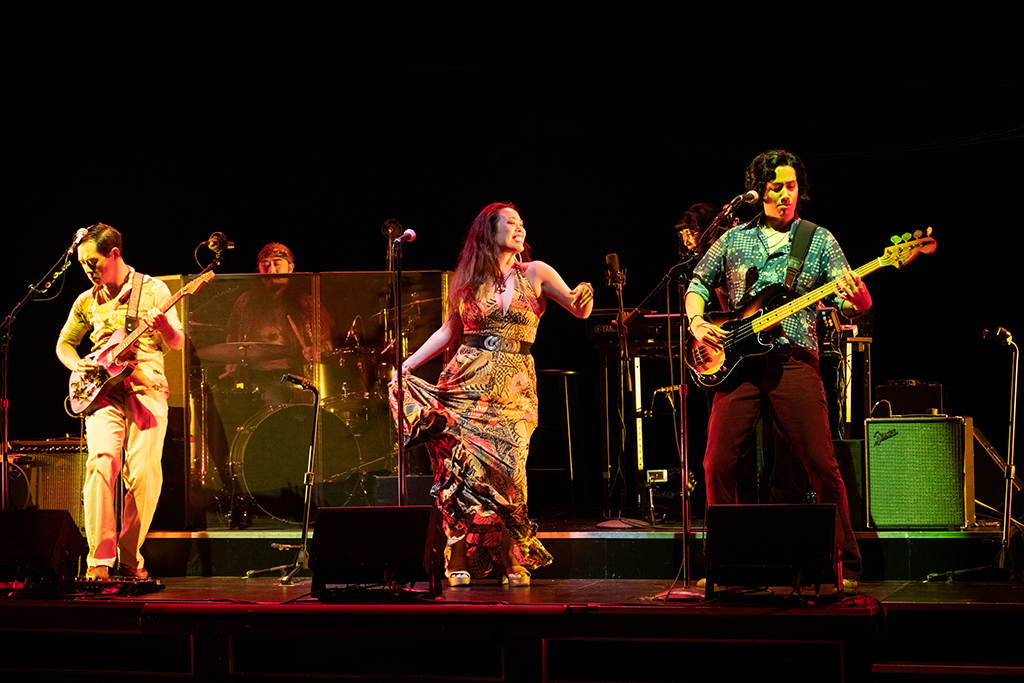By Andrew Hamlin
NORTHWEST ASIAN WEEKLY
With a musician/promoter for a father and a singer for a mother, Brooke Ishibashi, coming to Seattle for the “Cambodian Rock Band” rock musical, says she knew from a very early age that her upbringing was not quite typical.
I grew up in a musical household,” said Ishibashi. “My parents met in the 1970s when my mom auditioned to be the front woman in my dad’s R&B band. They then opened a music store, created a live music production company, and my childhood was full of backstage antics with Rock and Roll Hall of Famers like Ray Charles, Pat Benatar, The Temptations, Bonnie Raitt, and many more.
“My earliest memory performing was as a dancing, singing cranberry in an elementary school Thanksgiving play, where I had my very first solo: ‘The cranberry ran away before Thanksgiving Day. She said they’ll make a sauce outta me if I should stay!’”
The family, which included her parents, two older sisters, and her maternal grandmother, the well-known Japanese American singer Mary Nomura, was sometimes called the “Asian Partridge Family” by friends and neighbors, where their lack of normal, 9-to-5 jobs stood out, as well as their proudly artistic bent.
Although both sisters also became professional entertainers, and oldest sister Brittany had TV and film starring roles, Brooke Ishibashi remembers that the three “never really competed growing up. Dad would always say we were like different models of the same make of a car. Brittany was the BMW Roadster, Brianna was the BMW Sedan, I was the BMW SUV. We lifted each other up and were motivated by each other’s talents and ambitions, so it always felt like we were each other’s cheerleaders and biggest fans.”
She first got involved with “Cambodian Rock Band” back in 2016 when the show, written by Lauren Yee, was in a very rough form, workshopped by the South Coast Repertory theater, based in Costa Mesa, California. The original director, May Adrales, reached out specifically to AAPI actors who could also sing and/or play instruments.
Ishibashi describes the musical’s story as “equal parts history play, father-daughter drama, and epic rock concert,” involving a young woman trying to bring down a Khmer Rouge war criminal, decades after that political party laid waste to Cambodia. The actors double as musicians, playing more than a dozen songs, some written by the Dengue Fever band, others classic Cambodian pop.
Ishibashi herself sings eight songs in the Cambodian language Khmer, crediting the show’s Khmer consultant, Sokunthary Svay, for helping her master the language.
“It has been a very fruitful and collaborative process over the years,” she said, “and the show has greatly evolved under Lauren and [current director] Chay Yew’s influence. The most significant factor was bringing this story to Khmer audiences—specifically survivors and their families. We realized immediately that the story was giving survivors permission to share openly about the traumatic events of the past, when most had never spoken about these events ever before, and it created a space where families could heal together.
“At every theater, we work with our friends at Khmer Alumni Association based in Long Beach, California to host ‘Khmer Family Days,’ filling the theater with multiple generations of Cambodians, so that we can uplift their culture and honor what was lost and what survived.”
Asked about the most demanding aspects of the show, Ishibashi accentuated the physical.
“The most difficult part of the play is performing a nearly three-hour story about genocide, and putting your body through the stress and trauma that comes with it. It’s also incredibly difficult to flip back and forth from volatile, emotional scene work to highly technical and demanding singing. It’s an ongoing process of learning how to take care of my body and maintaining healthy boundaries so the work can be repeatable and sustainable.”
Asked about plans after the show, Ishibashi says she’s planning on a return to her base in New York City.
“I co-founded an arts advocacy organization called Be An #Arts Hero during the pandemic, and will continue our lobbying and educational work, as we evolve into Arts Workers United. At a time when the creative economy is suffering to return to pre-pandemic levels of prosperity, it is crucial for our lawmakers to understand the economic significance of the arts and culture sector so that we receive proportionate levels of funding.
“Arts and culture contribute $919 billion-plus to the U.S. economy, employing 5.2 million-plus arts workers. There is no American economic recovery without a robust arts & culture recovery. Our fates are intrinsically tied together.”
“Cambodian Rock Band” plays Sept. 29 through Nov. 5 at ACT’s Falls Theatre, 700 Union Street in Seattle. For prices, showtimes, and other information, visit acttheatre.org/2023-24-season/cambodian-rock-band.




Thank you for this great profile on a very talented young lady! Diversity is what makes the art world soar to heights we all benefit from! Continued success in the Big Apple!